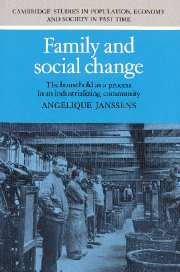Book contents
- Frontmatter
- Contents
- List of figures
- List of tables
- List of appendices
- Preface
- 1 Family and industrialization
- 2 The industrializing context: continuity and change in nineteenth-century Tilburg
- 3 Sources and methods
- 4 Family structure through time
- 5 Family life and the social structure
- 6 Family structure and geographical mobility
- 7 Family and work: the effect of the family economy on the structural characteristics of the household
- 8 Conclusion
- Appendices
- Bibliography
- Index
- Cambridge Studies in Population, Economy and Society in Past Time
8 - Conclusion
Published online by Cambridge University Press: 05 March 2012
- Frontmatter
- Contents
- List of figures
- List of tables
- List of appendices
- Preface
- 1 Family and industrialization
- 2 The industrializing context: continuity and change in nineteenth-century Tilburg
- 3 Sources and methods
- 4 Family structure through time
- 5 Family life and the social structure
- 6 Family structure and geographical mobility
- 7 Family and work: the effect of the family economy on the structural characteristics of the household
- 8 Conclusion
- Appendices
- Bibliography
- Index
- Cambridge Studies in Population, Economy and Society in Past Time
Summary
In this study I have attempted to trace the impact of the process of industrialization on family life in nineteenth-century Tilburg. In the mid-nineteenth century the town still consisted of a group of small hamlets whose population for the greatest part lived off the returns of small-scale domestic production and some small-scale farming. The textile mills and smoking chimneys that were already scattered throughout the town's spacious landscape had not yet decisively affected the rural outlook of a large part of its population. By the beginning of the twentieth century, however, major changes had occurred. Domestic textile production had almost completely disappeared or was at best relegated to the margins of the family economy; industrial production had assumed its dominant place. Labour had been removed from the household and centralized in the mills. In 1910 the town had become the tenth most populous city of The Netherlands, accounting for the major share of the national production of woollen textiles. These were certainly big changes, and may have removed the structural forces underpinning the community's traditional family system.
In the analysis of the impact of these changes on the strength of kinship ties I was led by structuralist family theories stressing a necessary development towards a nuclear family system in industrial society. Industrialization, these theories claim, would not only lead to a dissolution of extended kinship relations; the nuclear family, being best adapted to the mobility demands of industrial society, would also be the socially superior family form when compared with more ‘traditional’ types such as the extended family.
- Type
- Chapter
- Information
- Family and Social ChangeThe Household as a Process in an Industrializing Community, pp. 233 - 246Publisher: Cambridge University PressPrint publication year: 1993

